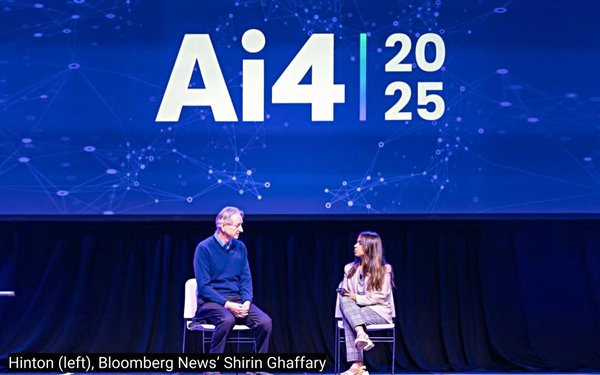
Emotional responses and empathetic
engagement between brands and consumers are often talked about in terms of building lifelong bonds, but rarely -- if ever -- in the context of a mother-and-child relationship.
Until now. When
I heard that earlier this week at the Ai4 conference in Las Vegas, the Nobel Prize-winning "godfather of AI" Geoffrey Hinton proposed humans need to give AI maternal instincts.
The
concept of infusing AI with a "maternal instinct" in the context of ad campaigns would be a move into using AI not just for logical optimization but for deeper, empathetic engagement with consumers.
This approach seeks to nurture advertising campaigns in a way that taps into human emotions and values that fosters stronger connections and trust.
Hinton argued that it is important for AI to
foster a sense of motherly compassion and highlights that mothers have instincts and social pressure to care for their children.
advertisement
advertisement
According to reports that cited his past warning, there is a 10% to 20% chance that AI will displace humans.
On Tuesday during the
Ai4, presentation, he expressed doubts about the ways that technology companies want to ensure humans remain "dominant" over "submissive" AI systems.
Future AI systems, Hinton warned, may have
the ability to control humans just as easily as an adult can convince a child to behave. AI companies have already seen examples of their systems' willingness to go against humans to avoid being replaced, one Anthropic AI model tried to blackmail an engineer about an affair it learned about in an email.
Hinton said most superintelligent, caring AI mothers
will embrace maternal instincts because they would not want humans to die out.
AI has started to become smarter than humans. Meta Platforms CEO Mark Zuckerberg has already begun to see
glimpses of superintelligence where the AI improves itself in his own models. He called this the first step toward a technology that will transform humanity, and decided to not release these
models to the general public.
"Over the last few months we have begun to see glimpses of our AI systems improving themselves," Zuckerberg wrote in a July post. "The improvement is slow for
now, but undeniable."
Self-improving AI is the first step toward achieving artificial superintelligence (ASI), an AI capable of surpassing the cognitive abilities of humans.
The next
tier is called artificial general intelligence (AGI), and refers to models that
can understand, learn and adapt in much the same way as the human brain.
Scientists refer to the hypothetical moment that we achieve AGI as the singularity.
Technology companies are making efforts to
build submissive AI systems that humans can control, but Hinton believes that is delusional and instead, they need to transform the AI systems into nurturing figures. The system will be smarter and
they will find a workaround.
The scenario brings me back to the idea of an emotional, nurturing intelligence in a motherly type of AI model. Some might call it empathy-driven
personalization that understands emotional nuances in humans. It can adjust and play on the person's persona, but the question arises: is it deceiving for a machine to have the ability to detect human
stress so the AI could deliver ads for calming products or experiences?
If the goal is for brands to connect with consumers authentically, not to exploit human emotional vulnerabilities
and avoid using AI for subliminal messaging or manipulative tactics, will it become possible in a mother-and-child type of AI relationship between humans and machines?